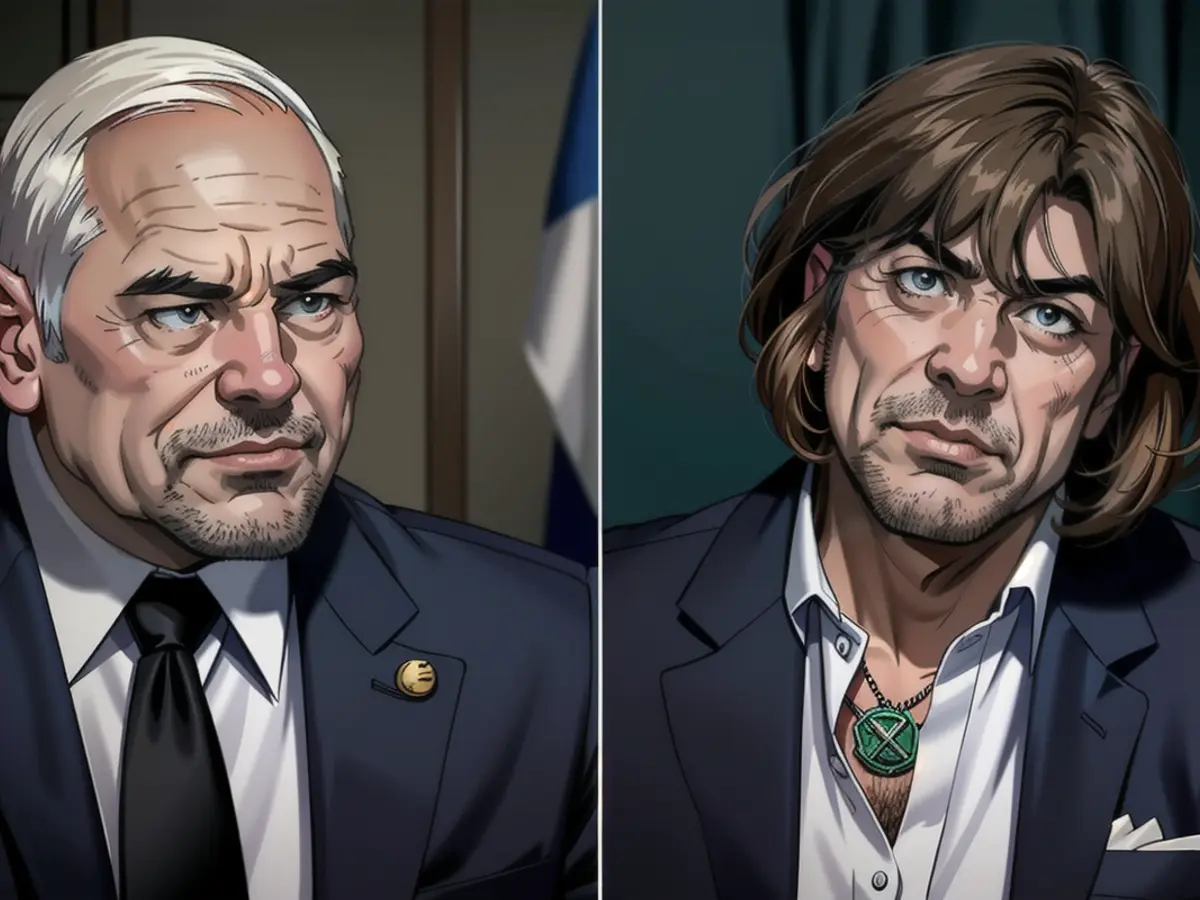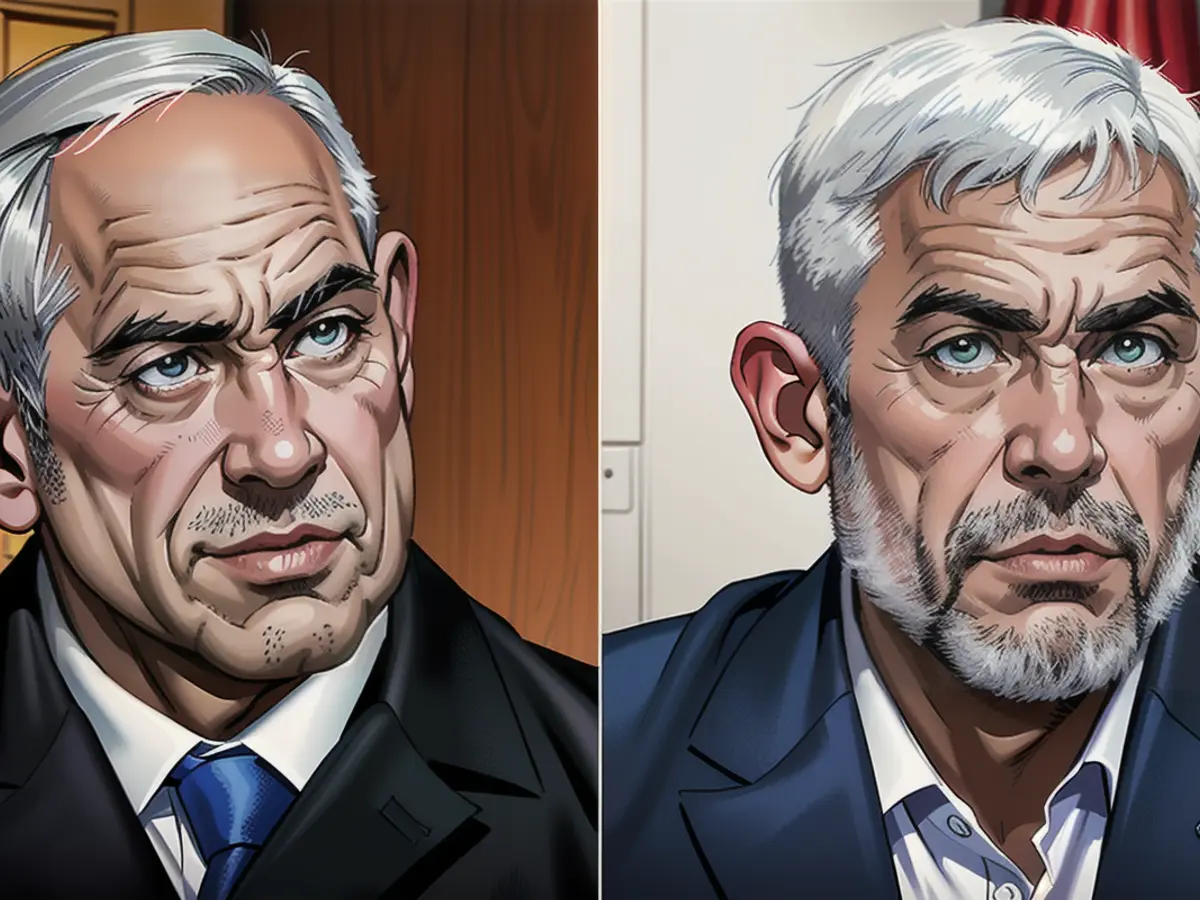Israeli and Hamas leaders could be subject to international arrest warrants. What does this entail?
A panel of judges might issue arrest warrants for Israeli Prime Minister Benjamin Netanyahu, Defense Minister Yoav Gallant, Gaza leader Yahya Sinwar, political chief Ismail Haniyah, and Mohammed Diab Ibrahim al-Masri, the head of Hamas's armed wing, who is also known as Mohammed Deif.
Here's what we understand about the cases at the International Criminal Court (ICC) and their potential effects on Israel and Hamas.
What do arrest warrants mean for Netanyahu and Hamas leaders?
The decision to seek arrest warrants doesn't automatically mean someone is guilty. Instead, it marks the first step in a process that could result in a prolonged trial.
If the court finds convincing proof of crimes, it can summon the suspect to appear voluntarily. Alternatively, the court can issue an arrest warrant and rely on member countries to make the arrest and send the suspect to the ICC.
If the suspect comes before the court, a pre-trial occurs where the court decides if there is enough evidence for the trial to proceed. Then, there's a trial before three ICC judges, during which the prosecution must show "beyond a reasonable doubt" that the individual is guilty of the crimes.
If found guilty, the accused individual may face up to 30 years in prison, while in rare cases, the court might sentence the individual to life.
The ICC has so far issued arrest warrants for 42 people, 21 of whom have been detained with the aid of member countries.
"The immediate hurdle for Israeli officials under any ICC arrest warrant would be that the court’s 124 member states would be under a legal obligation to arrest such officials if they travel to any one of those 124 countries," stated Chile Eboe-Osuji, a previous ICC president, this month in Foreign Policy magazine.
"That obligation should not be underestimated," he added, implying that "just last year, Putin cancelled his plans to attend the BRICS summit in South Africa, seemingly due to Pretoria’s obligation to arrest him."
Hamas leaders whom the warrants are sought - Sinwar and Deif - are thought to be in Gaza, while Haniyah resides in Qatar, which is not a signatory to the Rome Statute.
What is the ICC and who can it indict?
Established in 2002 and situated in The Hague, the Netherlands, the ICC is responsible for prosecuting individuals for acts of genocide, crimes against humanity, and war crimes.
The ICC is not an organ of the United Nations (UN), but it is endorsed by its General Assembly and maintains a cooperation agreement with the UN. When a case falls outside the ICC's jurisdiction, the UN Security Council can refer it to the ICC, granting it jurisdiction.
The court investigates alleged wrongdoings committed on the territory or by nationals of a state that has accepted the court's jurisdiction by signing the Rome Statute, the treaty that created the ICC. Any member country can ask the ICC's prosecutor to commence a probe.
The ICC has previously issued arrest warrants against high-ranking individuals, including previous Sudanese president Omar al-Bashir, Saif Gadhafi, the son of the late Libyan leader Muammar Gaddafi, and, most recently, Russian President Vladimir Putin.
Signatory countries are required to detain those with arrest warrants, but some figures have struggled to avoid them.
The ICC doesn't have its own execution force and depends on nations' cooperation for captures.
Does the ICC have jurisdiction over Israeli citizens?
The ICC has been investigating potential crimes committed by Israel since 2014 in Gaza, the occupied West Bank, and occupied East Jerusalem. The investigation started in March 2021 and was referred to the court by the Palestinian Authority, which accepted the ICC's jurisdiction in 2015 as the State of Palestine. The ICC determined then that its jurisdiction covers the Israel-Palestine conflict and, "by a majority," encompasses Gaza and the West Bank, including East Jerusalem.
Remarks by Netanyahu this month display concern about the ICC inquiry. Issuing arrest warrants for Israeli officials would leave a "permanent mark" on the edifice of international law and justice, the prime minister said, adding that the ICC "was established following the Holocaust" and must not jeopardize Israel's "fundamental right to self-defense."
Israel's ongoing conflict in Gaza, instigated by the Hamas attack on October 7 that resulted in the deaths of 1,200 people in Israel and over 250 hostages, has persisted for almost eight months.
Palestinian officials report that over 35,000 people have perished due to Israel's military onslaught on Gaza. The destruction of much of the region has left it in ruins and more than half of its 2.3 million population displaced within their country. The onset of famine looms in parts of the strip.
Can the ICC exercise authority over Hamas?
In 2015, Palestinian leaders joined the Rome Statute, giving the International Criminal Court (ICC) jurisdiction over actors in Gaza and other territories it governs. This naturally includes power over Hamas.
The ICC's prosecutor, Fatou Bensouda, confirmed this in October, stating that any offenses Israel or Hamas have allegedly committed in Gaza fall under the court's jurisdiction. This means that Hamas leaders could be indicted for potential crimes against both Israelis and Palestinians within the Gaza Strip.
Shelly Aviv Yeini, head of the international law department at the Israeli Hostage and Missing Families Forum, believes the ICC could hold Hamas responsible for wrongdoings, even if the Israeli state does not recognize its authority.
"We are a non-governmental organization (NGO), a separate entity," Yeini said in an interview with CNN. "We can file a claim on behalf of the hostages, even if the state (Israel) doesn't recognize its (the ICC's) jurisdiction."
In a statement on Monday, Bensouda revealed her intention to seek warrants "based on evidence collected and examined" by her office, and commended the hostages' families for their bravery in sharing their accounts.
The Rome Statute's Article 15 allows private individuals, groups, or entities to file complaints alleging criminal acts to the court.
A Hamas political bureau member, Muhammad Nazzal, cautioned against bringing the case to the ICC in February, arguing that it would hinder negotiations to restore the hostages.
"The quickest way to return their prisoners is to complete the negotiation process," Nazzal told CNN. "[Going to the ICC] is a mistake."


Read also:
- This will change in December
- Dikes withstand water masses so far - Scholz holds out the prospect of help
- Fireworks and parties ring in 2024 - turn of the year overshadowed by conflicts
- Attacks on ships in the Red Sea: shipping companies avoid important trade route
The International Criminal Court (ICC) has the potential to issue arrest warrants for Hamas leaders in Gaza, such as Yahya Sinwar and Ismail Haniyah, due to their alleged involvement in crimes against humanity and war crimes.
The inclusion of Hamas leaders in potential ICC arrest warrants highlights the court's jurisdiction over conflicts in territories governed by parties that have signed the Rome Statute, like Palestinian leaders in 2015.
Source: edition.cnn.com







